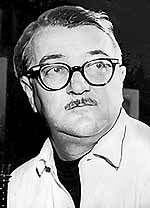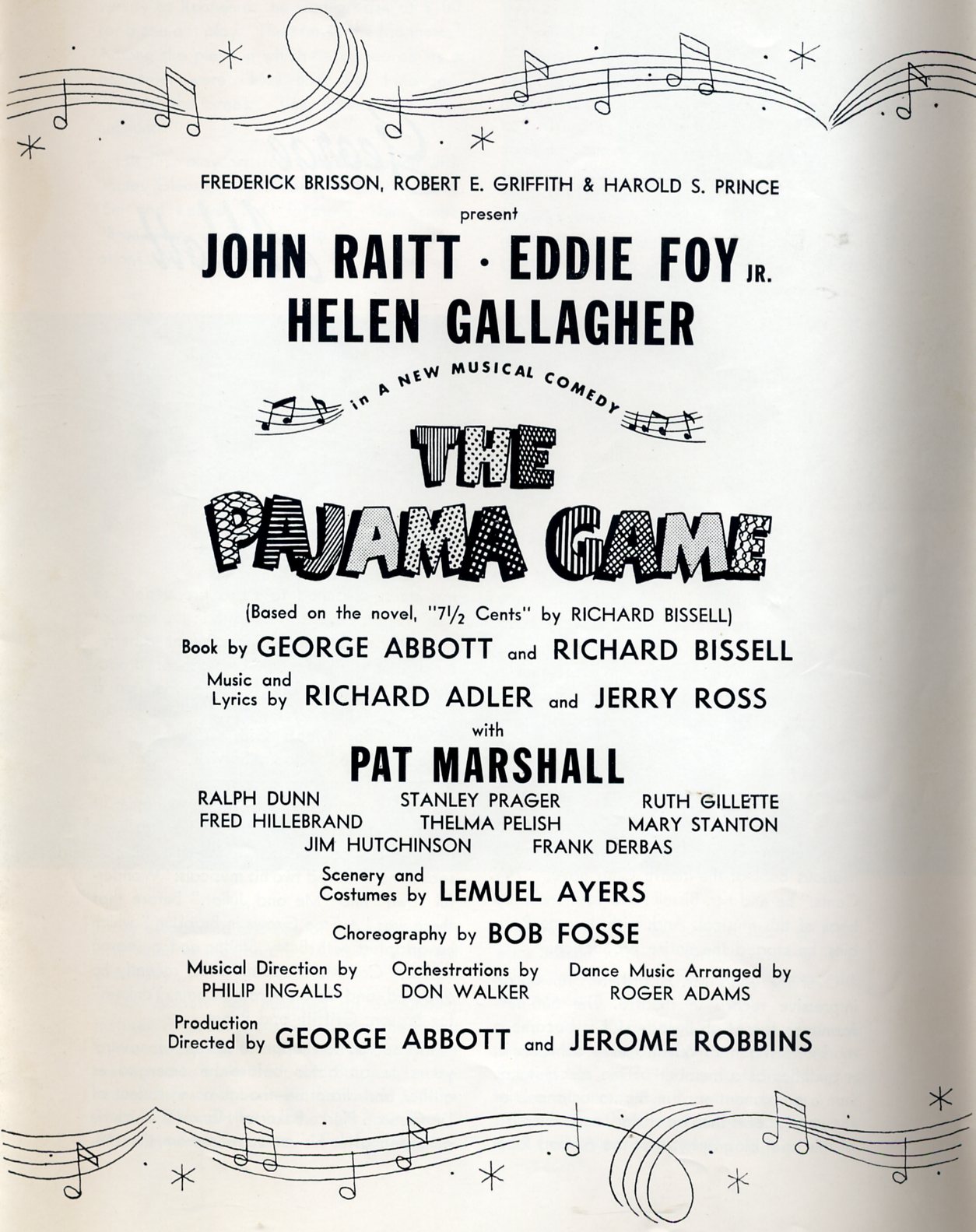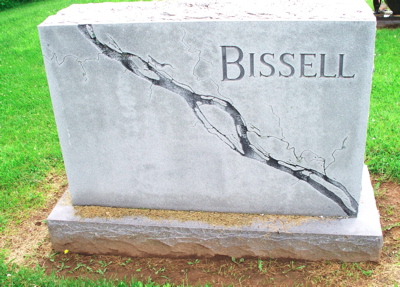Encyclopedia Dubuque
"Encyclopedia Dubuque is the online authority for all things Dubuque, written by the people who know the city best.”
Marshall Cohen—researcher and producer, CNN
Affiliated with the Local History Network of the State Historical Society of Iowa, and the Iowa Museum Association.
BISSELL, Richard: Difference between revisions
No edit summary |
No edit summary |
||
| Line 1: | Line 1: | ||
[[Image:bissell-mug.jpg|left|thumb|150px|Richard Pike Bissell]]BISSELL, Richard Pike. (Dubuque, IA, June 27, 1913--Dubuque, IA, 1977). Author. Bissell will be remembered as one of this nation's premier storytellers of life on the [[MISSISSIPPI RIVER]]. His novels ''Stretch on the River'' (1950) and ''High Water'' (1954) told of diesel tows. ''Goodbye, Ava'' (1960) dealt with two houseboats anchored to a dock on the Mississippi. | [[Image:bissell-mug.jpg|left|thumb|150px|Richard Pike Bissell]]BISSELL, Richard Pike. (Dubuque, IA, June 27, 1913--Dubuque, IA, 1977). Author. Bissell will be remembered as one of this nation's premier storytellers of life on the [[MISSISSIPPI RIVER]]. His novels ''Stretch on the River'' (1950) and ''High Water'' (1954) told of diesel tows. ''Goodbye, Ava'' (1960) dealt with two houseboats anchored to a dock on the Mississippi. His lifetime interest in the Mississippi River earned him the nickname "the Modern Day Mark Twain." (1) | ||
Bissell was the son of [[BISSELL, Frederick Ezekiel|Frederick Ezekiel BISSELL]] who owned the [[H. B. GLOVER COMPANY]], a producer of pajamas and shorts and best remembered between 1870 to 1910 as the manufacturer of Glover's Western Overalls. Richard Bissell's literary interests began at Phillips Exeter Academy in New Hampshire and were encouraged by his father who had been the editor of the Harvard College paper, the "Crimson," in 1900. Richard Bissell graduated from Harvard in 1936 with a B.A. in anthropology. His college experience was later recounted in ''You Can Always Tell a Harvard Man'' (1962). Before returning to Dubuque, Bissell worked for a short time as the only salesman for Edwin Land, the inventor of the photography method that grew into the huge Polaroid Corporation. | Bissell was the son of Edith Mary (Pike) Bissell and [[BISSELL, Frederick Ezekiel|Frederick Ezekiel BISSELL]] who owned the [[H. B. GLOVER COMPANY]], a producer of pajamas and shorts and best remembered between 1870 to 1910 as the manufacturer of Glover's Western Overalls. Richard Bissell's literary interests began at Phillips Exeter Academy in New Hampshire and were encouraged by his father who had been the editor of the Harvard College paper, the "Crimson," in 1900. Richard Bissell graduated from Harvard in 1936 with a B.A. in anthropology. His college experience was later recounted in ''You Can Always Tell a Harvard Man'' (1962). (2) Before returning to Dubuque, Bissell worked for a short time as the only salesman for Edwin Land, the inventor of the photography method that grew into the huge Polaroid Corporation. In Dubuque, he became a vice president in the H. B Glover Company. Turned down when he tried to enlist in the U. S. Navy during [[WORLD WAR II]], he worked for the Central Barge Company of Chicago on towboats along the Ohio, Monongahela, Mississippi, Illinois, and Tennessee rivers. (3) | ||
In 1949 "Coal Queen," a story about the Monongahela River and Bissell as a pilot on an old tug, won first prize in a national true-life story contest held by the ''Atlantic Monthly''. ''Stretch on the River'', a fictional biography of a deckhand on a coal barge heading from St. Louis to St. Paul, firmly established him as an author after its nation-wide critical acclaim. | In 1949 "Coal Queen," a story about the Monongahela River and Bissell as a pilot on an old tug, won first prize in a national true-life story contest held by the ''Atlantic Monthly''. ''Stretch on the River'', a fictional biography of a deckhand on a coal barge heading from St. Louis to St. Paul, firmly established him as an author after its nation-wide critical acclaim. He continued to write magazine articles and produced ''Monongahela,'' a volume in the Great Rivers of America series. (4) | ||
[[Image:imp284.jpg|right|thumb|250px|Photo courtesy: Bob Reding]]Bissell's life was dramatically changed by ''7 1/2 Cents'', a light-natured story of a strike in a pajama factory. The book was based on experiences Bissell had while working in his father's manufacturing plant. The novel, a look at conflicts between labor and management, became a Book of the Month Club selection. Collaborating with famed playwright George Abbott, Bissell turned the book into a musical comedy which was renamed the "Pajama Game." With choreography by Bob Fosse and a musical score written by Richard Adler and Jerry Ross, the story became one of the most popular musical comedies on Broadway during the 1950s. Bissell received a Tony Award and saw the play developed into a successful movie by the same name starring Eddie Foy, Jr. and Doris Day. In 1957 Bissell's ''Say, Darling'', telling of his Broadway experiences became another best-seller and the basis of another musical comedy in 1959. | [[Image:imp284.jpg|right|thumb|250px|Photo courtesy: Bob Reding]]Bissell's life was dramatically changed by ''7 1/2 Cents'', a light-natured story of a strike in a pajama factory. The book was based on experiences Bissell had while working in his father's manufacturing plant. (5) The novel, a look at conflicts between labor and management, became a Book of the Month Club selection. Collaborating with famed playwright George Abbott, Bissell turned the book into a musical comedy which was renamed the "Pajama Game." With choreography by Bob Fosse and a musical score written by Richard Adler and Jerry Ross, the story became one of the most popular musical comedies on Broadway during the 1950s. (6) Bissell received a Tony Award and saw the play developed into a successful movie by the same name starring Eddie Foy, Jr. and Doris Day. In 1957 Bissell's ''Say, Darling'', telling of his Broadway experiences became another best-seller and the basis of another musical comedy in 1959. | ||
Bissell | For the next fifteen years, Bissell continued writing books including Good By Ava (1960); Still Circling Moose Jaw (1965); How Many Miles to Galena? (1968), a take-off on travel books; Julia Harrington, Winnebago, Iowa (1969) and New Light on 1776 and All That (1975). (7) | ||
Bissell and his wife lived in Fairfield, Connecticut in a home designed by famous architect Stanford White. He traveled widely, belonged to eleven historical societies and established a collection ranging from antique cars to an 11-foot mirror which once hung in Mark Twain's New York home. In 1975 he and his wife, Marian, returned to Dubuque and lived in a house constructed by his grandfather. | Bissell and his wife lived in Fairfield, Connecticut in a home designed by famous architect Stanford White. He traveled widely, belonged to eleven historical societies and established a collection ranging from antique cars to an 11-foot mirror which once hung in Mark Twain's New York home. (8) In 1975 he and his wife, Marian, returned to Dubuque and lived in a house constructed by his grandfather. | ||
[[Image:bissell-1.jpg|left|thumb|250px|Cemetery marker showing the course of the Mississippi River]] | [[Image:bissell-1.jpg|left|thumb|250px|Cemetery marker showing the course of the Mississippi River]] | ||
--- | |||
Source: | |||
1. Hudson, David; Bergman, Marvin; Horton, Loren. ''The Biographical Dictionary of Iowa''. Iowa City: University of Iowa Press, 2008 p. 39 | |||
2. Ibid. p. 39 | |||
3. Ibid | |||
4. Ibid. | |||
5. Ibid. | |||
6. Ibid. | |||
7. Ibid. | |||
[[Category: Author]] | [[Category: Author]] | ||
Revision as of 17:15, 28 December 2012
BISSELL, Richard Pike. (Dubuque, IA, June 27, 1913--Dubuque, IA, 1977). Author. Bissell will be remembered as one of this nation's premier storytellers of life on the MISSISSIPPI RIVER. His novels Stretch on the River (1950) and High Water (1954) told of diesel tows. Goodbye, Ava (1960) dealt with two houseboats anchored to a dock on the Mississippi. His lifetime interest in the Mississippi River earned him the nickname "the Modern Day Mark Twain." (1)
Bissell was the son of Edith Mary (Pike) Bissell and Frederick Ezekiel BISSELL who owned the H. B. GLOVER COMPANY, a producer of pajamas and shorts and best remembered between 1870 to 1910 as the manufacturer of Glover's Western Overalls. Richard Bissell's literary interests began at Phillips Exeter Academy in New Hampshire and were encouraged by his father who had been the editor of the Harvard College paper, the "Crimson," in 1900. Richard Bissell graduated from Harvard in 1936 with a B.A. in anthropology. His college experience was later recounted in You Can Always Tell a Harvard Man (1962). (2) Before returning to Dubuque, Bissell worked for a short time as the only salesman for Edwin Land, the inventor of the photography method that grew into the huge Polaroid Corporation. In Dubuque, he became a vice president in the H. B Glover Company. Turned down when he tried to enlist in the U. S. Navy during WORLD WAR II, he worked for the Central Barge Company of Chicago on towboats along the Ohio, Monongahela, Mississippi, Illinois, and Tennessee rivers. (3)
In 1949 "Coal Queen," a story about the Monongahela River and Bissell as a pilot on an old tug, won first prize in a national true-life story contest held by the Atlantic Monthly. Stretch on the River, a fictional biography of a deckhand on a coal barge heading from St. Louis to St. Paul, firmly established him as an author after its nation-wide critical acclaim. He continued to write magazine articles and produced Monongahela, a volume in the Great Rivers of America series. (4)
Bissell's life was dramatically changed by 7 1/2 Cents, a light-natured story of a strike in a pajama factory. The book was based on experiences Bissell had while working in his father's manufacturing plant. (5) The novel, a look at conflicts between labor and management, became a Book of the Month Club selection. Collaborating with famed playwright George Abbott, Bissell turned the book into a musical comedy which was renamed the "Pajama Game." With choreography by Bob Fosse and a musical score written by Richard Adler and Jerry Ross, the story became one of the most popular musical comedies on Broadway during the 1950s. (6) Bissell received a Tony Award and saw the play developed into a successful movie by the same name starring Eddie Foy, Jr. and Doris Day. In 1957 Bissell's Say, Darling, telling of his Broadway experiences became another best-seller and the basis of another musical comedy in 1959.
For the next fifteen years, Bissell continued writing books including Good By Ava (1960); Still Circling Moose Jaw (1965); How Many Miles to Galena? (1968), a take-off on travel books; Julia Harrington, Winnebago, Iowa (1969) and New Light on 1776 and All That (1975). (7)
Bissell and his wife lived in Fairfield, Connecticut in a home designed by famous architect Stanford White. He traveled widely, belonged to eleven historical societies and established a collection ranging from antique cars to an 11-foot mirror which once hung in Mark Twain's New York home. (8) In 1975 he and his wife, Marian, returned to Dubuque and lived in a house constructed by his grandfather.
---
Source:
1. Hudson, David; Bergman, Marvin; Horton, Loren. The Biographical Dictionary of Iowa. Iowa City: University of Iowa Press, 2008 p. 39
2. Ibid. p. 39
3. Ibid
4. Ibid.
5. Ibid.
6. Ibid.
7. Ibid.




